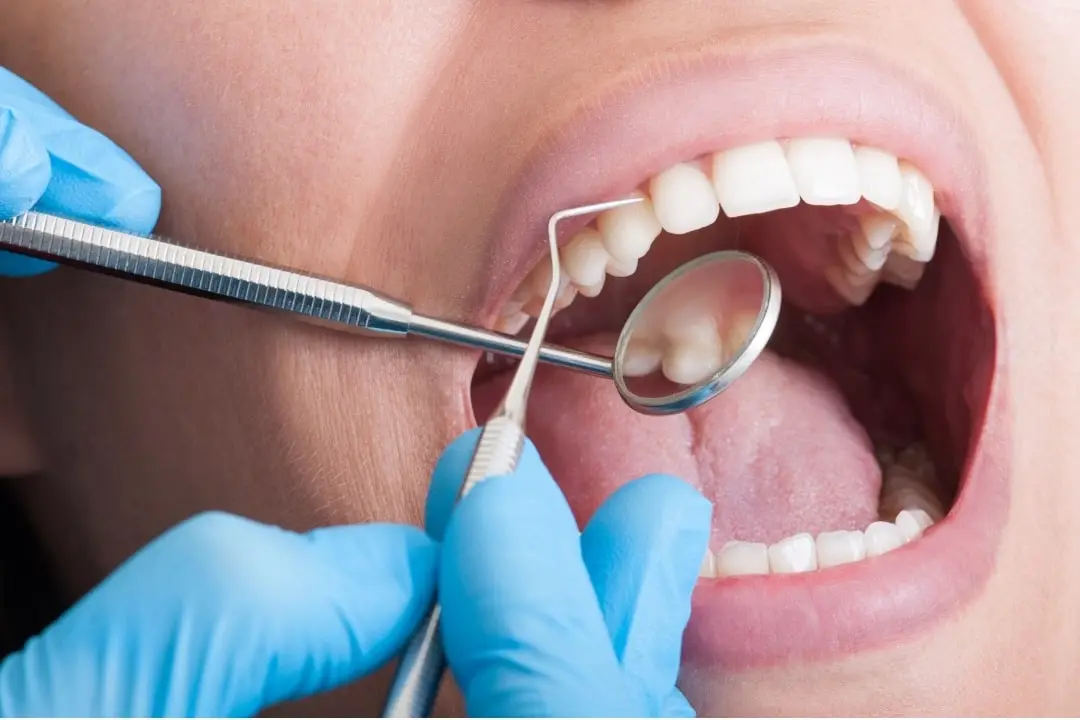You know that rough stuff on your teeth that doesn't go away no matter how hard you brush? Yeah, that's tartar and it's not just sitting there doing nothing.
It's like the unwanted guest at a party who not only shows up uninvited but also brings problems. It hardens, hides in the tight corners of your mouth, and quietly stirs up chaos. It gives bacteria a place to hang out. And the longer it stays, the more it messes with your gums and breath.

In the U.S. more than 42 % of adults aged 30 or older have signs of gum disease which often comes hand in hand with tartar build‑up.
But here's the good news: there are ways to deal with it. Let's talk about what tartar actually is, how it forms, what it does to your mouth.
What is tartar?
Tartar is hardened plaque that sticks to your teeth and doesn't come off with normal brushing. It builds up when plaque isn't cleaned away and turns into a rough, yellowish (sometimes brown) crust.
Now, think of plaque as that sticky film you get after eating. If you don't brush it off in time, it decides to stay and it hardens. That's tartar.
It usually shows up around the gumline, clings there like it owns the place, and traps stains like crazy. Your breath? Not great. Your gums? They're not happy either.
And here's the thing, you can't DIY this. No amount of brushing will get tartar off once it sets. You'll need a dental cleaning to scrape it away.
So yes, best not to let it move in. Brush, floss, rinse… keep it from getting comfy in the first place.
How to eliminate tartar on teeth?
Tartar's like that one guest who overstays their welcome. Plaque hangs out too long, hardens up and, you've got tartar. And brushing? No, you can't scrub it off like toothpaste on a plate.
So, how do you actually get rid of it?
You don't do it at home. Once it hardens, it's a job for the dentist. They've got special tools that chip it off without hurting your teeth. That's why those regular cleanings really matter, they're not just for show.
But here's what you can do: stop new tartar from showing up. Brush really well, twice a day. Floss, even if it's annoying. Mouthwash helps too. And stay away from sugary snacks all day long, they feed the bacteria that lead to plaque.
Basically, if you keep things clean and don't give plaque a chance to settle in, tartar won't have much to hold on to. Prevention's way easier than cleanup.
How do dentists remove tartar?
They start with a check-up. Using a small mirror, they look around each tooth, especially near the gums, to spot tartar build-up.
Then they use a tool called a scaler. It has a thin, curved tip. They gently scrape off the tartar stuck to the surface of your teeth. You might hear scraping, but it's not painful.
If there's a lot of tartar, they might switch to an ultrasonic scaler. This one uses tiny vibrations and water spray to break the tartar into bits and rinse it away.
Once the tartar's gone, they polish your teeth. That's the spinning brush with a special gritty paste. It smooths the surface so new plaque doesn't stick easily.
After that, they rinse your mouth and double-check. If needed, they'll apply a fluoride treatment to strengthen your enamel.
That's it. Simple, effective and something only a dentist can really do right.
Can you remove tartar at home?
No. Once tartar hardens on your teeth, brushing won't get it off.
You can slow it down, though. Brushing twice a day, flossing, using mouthwash those help keep plaque from turning into tartar in the first place. But after it hardens? You need a dentist.
Trying to scrape it off at home isn't safe. You could hurt your gums or damage your enamel. Best move? Let the pros handle it. Regular cleanings keep it under control.
How tartar affects oral health?
Tartar might look like just a bit of buildup, but it causes way more trouble than you'd think.
First, it gives bacteria a cozy place to hang out. Bacteria irritate your gums, and that's how gingivitis starts—red, swollen, sometimes bleeding gums. If you leave it alone, it can get worse. Like, deep-pocket infections worse. That's called periodontitis. And yes, it can lead to bone loss or loose teeth.
It also makes your breath stink. No surprise there—it traps food and bacteria. And, tartar is rough, so it scratches enamel and makes it easier for stains to stick.
So yes, tartar isn't just a cosmetic thing. It messes with your whole mouth. Best way to deal with it? Prevent it before it hardens, and get regular cleanings to stay ahead of it.
What are the complications of having tartar on your teeth?
Tartar is not just “a little buildup” that makes your teeth look yellow or dull. It actually messes with your mouth in bigger ways.
Once tartar sticks to your teeth, your gums start getting annoyed. They might get puffy, red or bleed when you brush. That's the early stage of gum trouble. But if you leave it alone? It can go deeper. Like, your gums start pulling back, bacteria sneak in under the surface and... yeah, it gets messy. You could even end up with bone loss or wobbly teeth down the line.
And you know that bad breath that won't go away no matter how much you brush? Tartar loves to hold onto stuff like that. Same with stains. It traps everything.
Worst part? You can't just brush it off. Once it's there, it stays until a dentist steps in.
What happens if you don't remove tartar?
- It sticks tight. Once tartar forms, you can't brush it off. It's locked in place.
- Gums get mad. Tartar makes them red, puffy and sometimes bleed when you brush.
- Breath? Not great. That bacteria build-up leads to bad smells that don't go away with mouthwash.
- Cavities sneak in. Tartar holds bacteria close to your teeth, making it easier for decay to happen.
- Gums start pulling back. Over time, it causes your gums to recede, showing more of your tooth.
- Teeth can loosen. If it goes deep enough, tartar damages the bone holding your teeth.
- Stains stick harder. Tartar grabs onto dark drinks like coffee or wine, making your teeth look worse.
- It just keeps growing. The longer you leave it, the more it builds and the harder it gets to clean.
How can you prevent tartar buildup?
- Brush twice a day. No skipping.
- Use a soft-bristle toothbrush. It's gentler but works.
- Try an electric toothbrush. Gets more off.
- Floss daily. Tartar loves the spots you miss.
- Rinse with mouthwash. Go for one that fights plaque.
- Cut back on sugar. Bacteria feed on it.
- Drink water after meals. Helps wash things away.
- Don't smoke. It makes tartar stick more.
- Watch your coffee and tea. They stain and help buildup.
- Visit your dentist regularly. They'll clean what you can't.
Why Wink Smile Turkey, Antalya?
Wink Smile Turkey stands out for its blend of craft and care. They don't rush. Dt. Müşerref Sert takes time to understand you and design your smile to match your face perfectly. You'll feel seen, not just another patient.
They use top-grade materials and modern tech, so results last and look natural, not fake. It's not just about teeth, it's about confidence.
Enjoy Antalya while you're here. You get excellent dental care and a mini holiday: sea views, warm sunshine, local hospitality.
Ready to start your journey? Contact with dental clinic in Antalya today and set up a chat with Dt. Müşerref Sert. Your perfect smile (and a great trip) could be just a message away.

